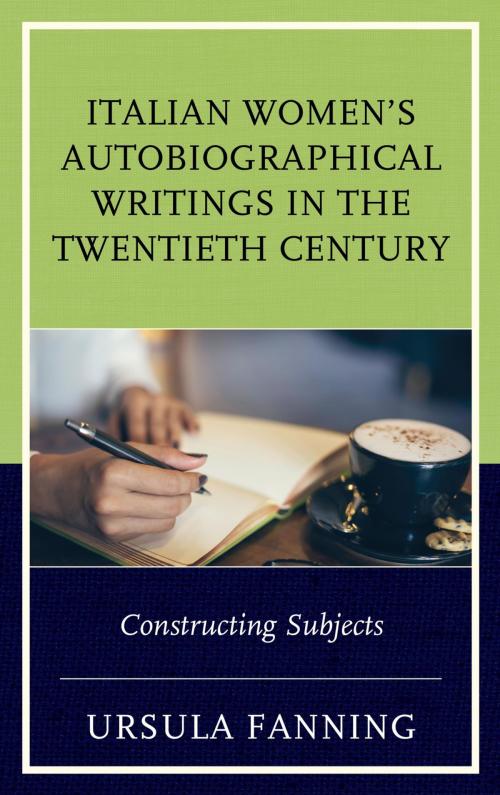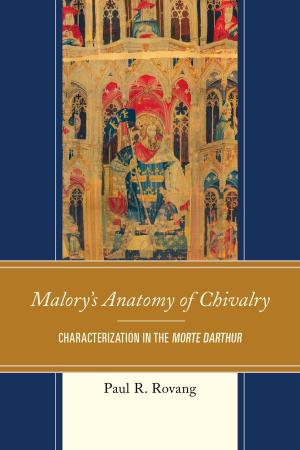Italian Women's Autobiographical Writings in the Twentieth Century
Constructing Subjects
Fiction & Literature, Literary Theory & Criticism, European, Italian, Women Authors| Author: | Ursula Fanning | ISBN: | 9781683930327 |
| Publisher: | Fairleigh Dickinson University Press | Publication: | September 7, 2017 |
| Imprint: | Fairleigh Dickinson University Press | Language: | English |
| Author: | Ursula Fanning |
| ISBN: | 9781683930327 |
| Publisher: | Fairleigh Dickinson University Press |
| Publication: | September 7, 2017 |
| Imprint: | Fairleigh Dickinson University Press |
| Language: | English |
This book highlights the centrality of the autobiographical enterprise to Italian women’s writing through the twentieth century—a century that has frequently been referred to as the century of the self. Ursula Fanning addresses the thorny issue of essentialism potentially involved in underlining links between women’s writing and autobiographical modes, and ultimately rejects it in favor of an argument based on the cultural, linguistic, and literary marginalization of women writers within the Italian context. It is concerned with Italian women writers’ various ways of grappling with constructions of subjectivity throughout the century and sets out to explore them. Fanning reads autobiographical writing as subject to many of the same constraints as fiction and, in doing so, draws attention to the significance of the recurring use of the terms “pure” and “impure” in many critical and theoretical discussions of the autobiographical (where “pure” is used to suggest a truthful representation of a life, while “impure” suggests the messy undertaking of mixing lived experience with fiction).
Recurring patterns and paradigms are found in the works of the various writers considered (eighteen in all), and these paradigms are analyzed through close readings of their works. These close readings offer insights into approaches to the constructions of subjectivity in the narratives and are informed by feminist theories. The chapters focus on selves in relationship, taking their lead from the patterns unfolding in the writers’ work, hence the subjects are constructed as daughters (with different views of the self in relation to fathers and mothers), within the confines of the romantic relationship (which involves reconsiderations and rewritings of the romance plot), as maternal subjects, and as writers (with an eye on their relationship to the literary canon, as well as to the relationship with readers).
This book argues that there is such a thing as gendered subjectivity and that its constructions may be traced through the texts analyzed.
This book highlights the centrality of the autobiographical enterprise to Italian women’s writing through the twentieth century—a century that has frequently been referred to as the century of the self. Ursula Fanning addresses the thorny issue of essentialism potentially involved in underlining links between women’s writing and autobiographical modes, and ultimately rejects it in favor of an argument based on the cultural, linguistic, and literary marginalization of women writers within the Italian context. It is concerned with Italian women writers’ various ways of grappling with constructions of subjectivity throughout the century and sets out to explore them. Fanning reads autobiographical writing as subject to many of the same constraints as fiction and, in doing so, draws attention to the significance of the recurring use of the terms “pure” and “impure” in many critical and theoretical discussions of the autobiographical (where “pure” is used to suggest a truthful representation of a life, while “impure” suggests the messy undertaking of mixing lived experience with fiction).
Recurring patterns and paradigms are found in the works of the various writers considered (eighteen in all), and these paradigms are analyzed through close readings of their works. These close readings offer insights into approaches to the constructions of subjectivity in the narratives and are informed by feminist theories. The chapters focus on selves in relationship, taking their lead from the patterns unfolding in the writers’ work, hence the subjects are constructed as daughters (with different views of the self in relation to fathers and mothers), within the confines of the romantic relationship (which involves reconsiderations and rewritings of the romance plot), as maternal subjects, and as writers (with an eye on their relationship to the literary canon, as well as to the relationship with readers).
This book argues that there is such a thing as gendered subjectivity and that its constructions may be traced through the texts analyzed.















